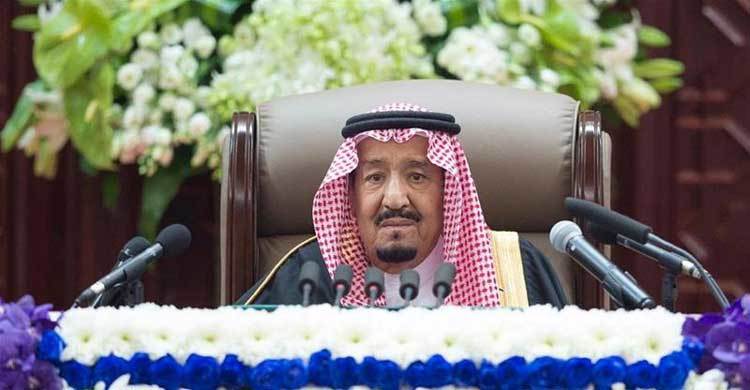Saudi King silent on Khashoggi in annual Shura address

Saudi Arabia's King Salman bin Abdulaziz has addressed the kingdom's Shura Council but refrained from mentioning the case of murdered Saudi journalist Jamal Khashoggi.
In a highly anticipated address to the council, the 82-year-old monarch on Monday lauded his country's judiciary and public prosecution for "carrying out their duty in the service of justice", without directly invoking the killing of the Washington Post columnist.
Khashoggi - a critic of the powerful Saudi Crown Prince Mohammed bin Salman, also known as MBS - was killed in the kingdom's consulate in Istanbul on October 2.
Last week, Saudi prosecutors announced they would push for the death penalty for five suspects in connection with the murder of Khashoggi.
The king's speech came as members of the US Congress renewed their calls to condemn the kingdom following a reported assessment by the CIA that MBS personally ordered Khashoggi's murder.
'Standing by his son'
Elsewhere in the short speech, the king reiterated his support for the United Nations' efforts to end the war in Yemen, where his country has been leading a massive air campaign against Houthi rebels - and said that the Palestinian issue was a "top priority for the kingdom".
King Salman said that Riyadh supported a political solution in Syria, ensuring the return of Syrian refugees to their homeland, and called on the international community to halt Iran's nuclear and ballistic missile programmes.
In regards to the crown prince, King Salman said he has been directed to "focus on developing human capabilities and preparing the new generation for future jobs".
Commenting on the televised address, Marwan Kaballan, director of the Arab Center for Research and Policy Studies, said that the king appeared to indirectly mention the murdered journalist's case in his speech.
"I think he wants the whole world to know that he is standing by his son [MBS]. That was clear in two aspects; the economic one, when he talked about the private sector and somehow was referring to the 2030 vision of the crown prince, and when he ended his speech by talking about his trust in the judicial system," Kaballan told Al Jazeera.
"He was trying to bring back the Saudi foreign policies to where it was traditionally; reiterating the traditional Saudi policy on Palestine. He talked about Yemen, saying that Saudi Arabia is seeking a political solution to the Yemen conflict ... He talked about Syria and the Syrian refugees. He talked about his country's role in maintaining stability in the oil market," Kaballan said.
International pressure
The king's speech came shortly after Germany's Foreign Minister Heiko Maas announced that Berlin has banned 18 Saudi nationals from entering Europe's border-free Schengen zone because of their alleged connection to Khashoggi's killing.
Maas told reporters in Brussels on Monday that Germany issued the ban for the 26-nation zone in close coordination with France, which is part of the Schengen area, and Britain, which is not.
"As before, there are more questions than answers in this case, with the crime itself and who is behind it," he said.
The German measure preceded renewed calls by the US Congress to the administration of US President Donald Trump to condemn the kingdom following a reported assessment by the CIA that the crown prince personally ordered the murder of Khashoggi.
"It is certainly testing the position that the enemy of our enemy is our friend," said Representative Adam Schiff, a Democrat from California, and a frequent critic of Trump.
"The president needs to listen to what our intelligence community has to say."
But Trump has refused to listen to the audio tapes of the murder because the content is too graphic.
"It's a suffering tape, it's a terrible tape. I've been fully briefed on it, there's no reason for me to hear it...," he told "Fox News Sunday".
Trump, who considers Saudis vital allies in his Middle East policy, has been buying time on the issue as more evidence piles up in the case.
Crown prince a 'destructive force'
Meanwhile, divisions at the top of the US Republican party are deepening over the murder of the Saudi journalist.
Senator Lindsey Graham, a Trump ally, called the Saudi crown prince "unhinged" in an interview with NBC News on Sunday.
"They are an important ally, but when it comes to the crown prince, he is irrational, he is unhinged, and I think he has done a lot of damage to the relationship between the United States and Saudi Arabia and I have no intention of working with him ever again," Graham said on Sunday's "Meet The Press".
"I am going to do whatever I can to place blame where I believe it lies: I am going to put it at the feet of the crown prince who has been a destructive force in the Mideast [Middle East].
"If he is going to be the face of Saudi Arabia going forward, I think the kingdom will have a hard time on the world stage."
While the US has imposed sanctions on 17 Saudi officials, others in Congress are pushing for much tougher punishment.
"… We need to punish who ordered this. Who's in charge and really the only thing they understand over there is strength," said Republican Senator Rand Paul.
"I think they will see sanctions as weakness on the part of the president, and if the president wants to act strongly he should cut off the arms sale," he told CBS's "Face The Nation" show.
Source: Aljazeera



